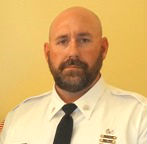 In my 10 years as a corrections officer, I have witnessed many changes – the biggest of which has been our approach to responding to people who are incarcerated who have a mental health diagnosis. Stressful and challenging, working in the mental health unit of a state correctional institution is hard. Fortunately for everyone, Mental Health First Aid has changed the way we do our job.
In my 10 years as a corrections officer, I have witnessed many changes – the biggest of which has been our approach to responding to people who are incarcerated who have a mental health diagnosis. Stressful and challenging, working in the mental health unit of a state correctional institution is hard. Fortunately for everyone, Mental Health First Aid has changed the way we do our job.
In the past, we might not have recognized the signs of a mental health crisis – even within the mental health unit. A person who is incarcerated that refused to cooperate with instructions may have been seen as simply being non-compliant – making a conscious choice not to follow an order. A person who is incarcerated that is hallucinating or experiencing psychosis, for example, may not be in a position to follow orders. Before Mental Health First Aid, we were not trained to see it that way. Rather, non-compliance was a disciplinary issue.
Today, every member of my department has now completed Mental Health First Aid training – and because of it, we respond differently. Instead of using an authoritative, “command and control” style with a person who is incarcerated who is experiencing a mental health crisis, we begin with a more compassionate and empathetic approach. Our officers are trained to tell the difference between non-compliance and a person who is incarcerated who cannot follow orders because they are in crisis.
We let them know we understand that they may not be able to control themselves. We listen more deeply so that we can understand what is happening. We deescalate the situation so they do not feel threatened. Doing so reduces the need for force, which is better for everyone – for those who are incarcerated as well as corrections officers.
Corrections facilities are not factories and we cannot deal with people in a one size fits all, black and white manner. We have to work with people who are incarcerated as individuals. We observe them; we interact with them; we see changes in their behavior and can report those changes to the treatment team so they have an immediate understanding of the person’s health. Part of our job is to have compassion and empathy, something you might not expect from a corrections officer. But our goal is to help people receive the necessary treatment while they are in our care and complete their service in a timely way so they can return to their community.
Mental Health First Aid has given us important tools – how to talk, how to stand, what questions to ask, how to listen, how to evaluate a situation – and with those tools we can do our job better while keeping everyone safe.
Mental Health First Aid also helps us as individuals. Many corrections officers are military veterans. I served for 13 years as an active duty Marine with the Pennsylvania Army National Guard and I was deployed to Afghanistan. When I came home, I went back to work very quickly, without much time to decompress and think about what I experienced during my deployment. This is true for a lot of my peers. We jump back into civilian life and we put our problems on the back burner. With Mental Health First Aid training, we are better equipped to help each other.
This job is tough, there’s no doubt about it. But we are a family that takes care of one another and when one of my colleagues is experiencing a mental health challenge or crisis, I now know how to help them. I know how important it is to tell them they are not alone and that it’s okay to ask for help.
I wish that every corrections officer could receive Mental Health First Aid training. I believe that our corrections system would be better because of it – those who are incarcerated would benefit, the officers would benefit and ultimately our communities would benefit.